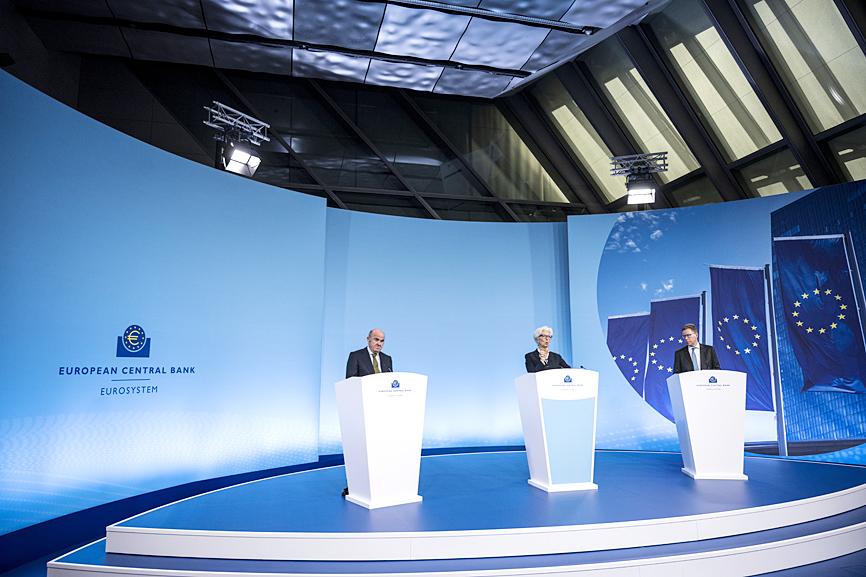European Central Bank (ECB) President Christine Lagarde is no longer ruling out an interest-rate hike this year, a pivot toward the tightening stance of global peers that officials privately see materializing with a shift in policy guidance as soon as next month.
Investors brought forward bets on ECB action as the monetary chief delivered surprisingly hawkish comments citing unexpected record inflation data, contrasting with an earlier decision statement on Thursday that kept intact its formal view that price increases would ease.
She spoke after policymakers agreed that it is no longer sensible to exclude a rate move this year, and that bond buying could end in the third quarter, said officials familiar with their thinking who asked not to be identified because such discussions are confidential.

Photo: EPA-EFE
An ECB spokesman declined to comment.
Those views were reflected in Lagarde’s public remarks, although she also insisted that the Governing Council would not rush to conclusions on its formal stance, telling reporters at a virtual news conference to wait for upcoming meetings for a fuller judgement.
That would include a reassessment of its asset purchases next month.
“Concern was across the board,” she said, referring to officials’ reaction to another record reading for eurozone inflation released the previous day. “Our March meeting, and then later on, our June meeting will be critically important to determine whether the three criterias of our forward guidance are fully satisfied.”
The comments point to sands shifting under the ECB’s monetary stance amid accelerating global tightening. Until now, Frankfurt policymakers had protested at investor bets on the prospect higher borrowing costs this year.
Earlier on Thursday, the Bank of England raised rates by one-quarter of a percentage point, in a decision where only the opposition of Governor Andrew Bailey prevented an even bigger move. The US Federal Reserve is also poised to remove stimulus.
“Compared with our expectations in December, risks to the inflation outlook are tilted to the upside, particularly in the near term,” Lagarde said. “There was also a concern and a determination around the table not to rush into decision unless we had a proper and thorough assessment based on data and the analytical work that will take place in the next few weeks.”
The euro extended gains to more than 1 percent, set for the biggest advance in more than a year. Investors briefly priced in a 10-basis-point hike as soon as June, and up to 40 basis points of tightening by year-end.
The news briefing turned out “more hawkish than expected, with Lagarde opening up the possibility of material changes in ECB policy following the forecast round in March,” Evercore ISI strategist Krishna Guha said in a report.
Consumer prices in the euro area rose an annual 5.1 percent last month, surpassing economist estimates by the most in at least two decades and remaining more than double the ECB’s 2 percent target.
Lagarde said there were signs that supply bottlenecks that have held back manufacturing firms and pushed up costs are easing, although they would persist for some time.
While the president acknowledged that measures of underlying inflation had risen, their persistence is uncertain, she said.
Wage growth — deemed a key factor for faster price increases in the medium term — remains “muted overall,” she said.

To many, Tatu City on the outskirts of Nairobi looks like a success. The first city entirely built by a private company to be operational in east Africa, with about 25,000 people living and working there, it accounts for about two-thirds of all foreign investment in Kenya. Its low-tax status has attracted more than 100 businesses including Heineken, coffee brand Dormans, and the biggest call-center and cold-chain transport firms in the region. However, to some local politicians, Tatu City has looked more like a target for extortion. A parade of governors have demanded land worth millions of dollars in exchange

An Indonesian animated movie is smashing regional box office records and could be set for wider success as it prepares to open beyond the Southeast Asian archipelago’s silver screens. Jumbo — a film based on the adventures of main character, Don, a large orphaned Indonesian boy facing bullying at school — last month became the highest-grossing Southeast Asian animated film, raking in more than US$8 million. Released at the end of March to coincide with the Eid holidays after the Islamic fasting month of Ramadan, the movie has hit 8 million ticket sales, the third-highest in Indonesian cinema history, Film

BIG BUCKS: Chairman Wei is expected to receive NT$34.12 million on a proposed NT$5 cash dividend plan, while the National Development Fund would get NT$8.27 billion Taiwan Semiconductor Manufacturing Co (TSMC, 台積電), the world’s largest contract chipmaker, yesterday announced that its board of directors approved US$15.25 billion in capital appropriations for long-term expansion to meet growing demand. The funds are to be used for installing advanced technology and packaging capacity, expanding mature and specialty technology, and constructing fabs with facility systems, TSMC said in a statement. The board also approved a proposal to distribute a NT$5 cash dividend per share, based on first-quarter earnings per share of NT$13.94, it said. That surpasses the NT$4.50 dividend for the fourth quarter of last year. TSMC has said that while it is eager

‘IMMENSE SWAY’: The top 50 companies, based on market cap, shape everything from technology to consumer trends, advisory firm Visual Capitalist said Taiwan Semiconductor Manufacturing Co (TSMC, 台積電) was ranked the 10th-most valuable company globally this year, market information advisory firm Visual Capitalist said. TSMC sat on a market cap of about US$915 billion as of Monday last week, making it the 10th-most valuable company in the world and No. 1 in Asia, the publisher said in its “50 Most Valuable Companies in the World” list. Visual Capitalist described TSMC as the world’s largest dedicated semiconductor foundry operator that rolls out chips for major tech names such as US consumer electronics brand Apple Inc, and artificial intelligence (AI) chip designers Nvidia Corp and Advanced